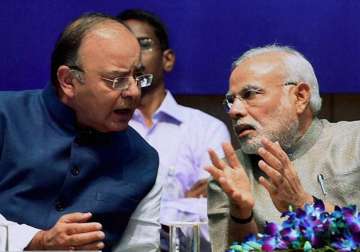Modi government mulls advancing Union Budget to January, will help taxpayers plan better
Union Budget has been presented on last day of February since the colonial days, but this could soon change as the Modi government is mulling advancing it to January end. If implemented, it will allow

Union Budget has been presented on last day of February since the colonial days, but this could soon change as the Modi government is mulling advancing it to January end.
If implemented, it will allow individuals and companies more time to firm up savings and tax payout plans.
Tax players will get two months time to adjust personal finances and investments, according to New Tax provisions in the Budget.
It will also allow more time for Companies to start provisioning for advance taxes keeping in mind changes in the corporate tax structure.
The budget is usually presented on the last working day of February, a month before the new financial year begins on April 1.
However, opposition Congress is not on the same page with the government on this issue
“What is the logic behind changing a time-tested method? If the budget is presented in January, the finances of the country will not be clear by then,” said Veerappa Moily, the Congress’s Lok Sabha MP and a former law and corporate affairs minister.
Finance Ministry is doing an overhaul of the entire Budget making exercise which may see scrapping of the current practice of presenting a separate budget for Railways and the Budget document getting slimmer with indirect tax proposals finding almost no mention after excise duties, service tax and cesses being subsumed in the Goods and Service Tax (GST) regime.
Also on the anvil is abolition of distinction between Plan and non-Plan expenditure and replacing it with capital and revenue expenditure.
Sources said the government is of the view that the Budget exercise should ideally be over by March 31 every year as against the present practice of it being carried in two phases spread between February and May.
While the Constitution does not mandate any specific date for presentation of the Budget, it is usually presented on last working day of February and the two-stage process of Parliamentary approval takes it to mid-May.
As the financial year begins on April 1, the government in March takes Parliament approval for Vote on Account for a sum of money sufficient to meet expenditure on various items for two to three months. Demands and Appropriation Bill, entailing full year expenditure as well as tax changes, is then passed in April/May.
Sources said the finance ministry is of the view that if the process is initiated earlier, there would be no need for getting a Vote on Account and a full budget can be approved in one stage process before March 31.
The proposal before the government is to present the Budget in last week of January, preferably on January 31 and ramp up the entire process by March 31, they said.
The revenue department is also mulling preponing its pre-budget meetings with various stakeholders to September instead of holding them in November/December.
Besides the date of presentation of the Budget, the annual financial document for 2017-18 is likely to see another major overhaul with the abolition of 'Plan and non-plan expenditure' and replacing it with 'capital and revenue expenditure'.
The expenditure department in its pre-budget meetings with various other ministries and government departments will this time around seek for details of their envisaged revenue and capital expenditure from April 2017-March 2018.
"States are being consulted for capital and revenue expenditure classification. An internal group is working on it. This will give the right direction in simplification of accounts and also how we focus on expenditure," another source said.
PTI inputs